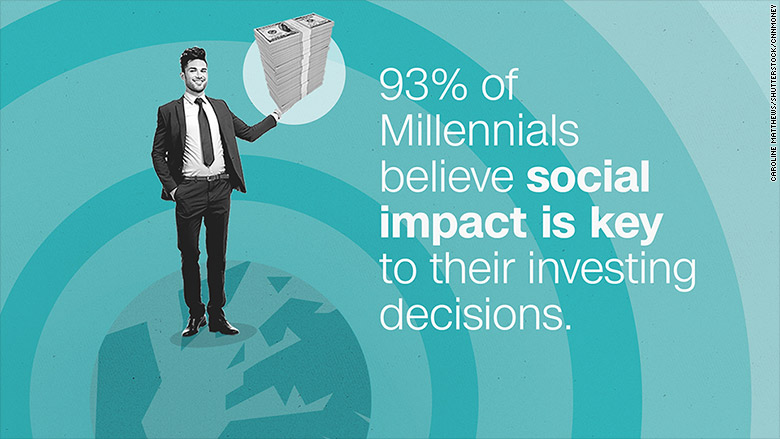
Millennials are changing the investing agenda.
They don't just want to grow their money: Many Millennials want to achieve social and environmental goals through their investments. It's called "impact investing" and it's not just a buzz word.
"Impact investing is hitting the mainstream," says Jackie VanderBrug, investment strategist at U.S. Trust, a division of Bank of America (BAC). "We're hitting a tipping point."
VanderBrug knows. She and her team at U.S. Trust recently surveyed 684 individuals with investable assets worth $3 million or more. Among the millionaires, dozens were Millennials between the ages of 18 and 35.
The overwhelming majority of Millennials surveyed -- 93% -- believe that a company's social and environmental impact is key to their investing decisions. That's up from 74% two years ago, according to the U.S. Trust study.
In some ways, it's not new. Students have long protested at universities to end investments in coal or against governments like South Africa during the apartheid era. Last year, Columbia University and the University of Southern California both dumped their investments in prison stocks after student protests.
But instead of divesting, new investors want to see companies make an impact in a positive way.
Related: How much money you need to start investing
Their older peers also agree. This year, 51% of Baby Boomer investors believe impact investing is key to where they park their cash, up from 46%. All age groups have increased their preference for impact investing over the past two years.
Former Vice President Al Gore is one impact investor. His investing firm, Generation, manages $12 billion.
"Sustainability values should be completely integrated in the investing process," Gore said in November at the Dealbook Conference.
Despite the buzz, experts admit there are challenges. Here are the top ones:
1. Defining "impact investing" is a challenge. It includes a wide swath of subjects, from gender equality and renewable energy to affordable housing and environmental policies. So they don't all appeal to the same people.
2. How it benefits investors is sometimes hard to measure. Fixing abstract problems like gender inequality through private investment don't have easy yardsticks for success.
3. Impact investing is often confused or conflated with philanthropy -- many investors don't want to blend the two, either for moral reasons or tax purposes (you can write off philanthropic donations when you file your taxes).
Related: Millionaires chalk up success to hard work, family values
Still, companies are becoming more transparent, experts say. Last year, over 7,000 companies issued corporate responsibility reports, which are audited by a third party. That's up from only 27 such reports in 1992, says VanderBrug.
And some people are trying to tackle the challenges facing impact investors. Christina Alfonso is the CEO of Madeira Global, a firm based in New York that specializes in data analytics that pertain to ESG -- environmental, social and governance.
Her firm focuses on scoring private equity companies on a framework that has a scale of 0 to 100. Madeira ranks firms on a range of factors, such environmental policies, governance and social impact.
"It allows us to benchmark companies across industries, geographies and growth stages," says Alfonso.
One often-cited socially responsible company is Starbucks (SBUX). It seeks to buy coffee grown in an ethical manner. It also helps employees pay for college, among other initiatives.
"We've seen that non-financial factors can play a significant role in a company's financial performance as consumers and investors increasingly support businesses that consider social impact as well as profitability," says Alfonso.


